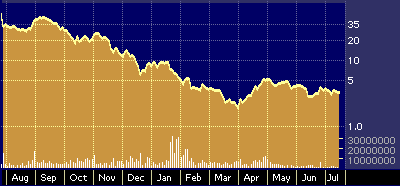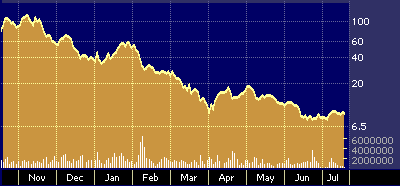
InfoSpace Leads Next Wireless Trend
InfoSpace Leads Next Wireless Trend
By Hal Plotkin
Silicon Valley Correspondent
Several leading analysts who follow wireless industry trends see major upside potential for InfoSpace Inc.’s {INSP} stock over the coming year, saying the company is emerging as a leading enabler of mobile, wireless-Internet applications.
“With wireless subscribers expected to exceed 1 billion worldwide by 2003, the convergence of wireless with the Internet has created extraordinary opportunities for wireless Internet infrastructure providers, such as INSP,” wrote Prabhas Panigrahi, an analyst at Dresdner Kleinwort Benson in New York, in a short research note published earlier this month.
Panigrahi, who has a reputation for producing unusually detailed and persuasive research, plans to publish a more-comprehensive report supporting the stock later this month.
In the meantime, the analyst has initiated coverage of InfoSpace with a “buy” rating, his firm’s highest recommendation, and an estimated 12-month fair equity valuation, or price target, of $70 a share.
InfoSpace’s post-initial public offering stock chart has the typical dot-com
roller-coaster look and feel. One reason may be the fact that the company was first established as InfoSpace.com Inc. and only recently decided to drop the dot-com label in recognition of its move toward serving evolving
wireless-application markets.

InfoSpace 52-Week Stock-Performance Chart
But analysts say they like the synergy between the old InfoSpace.com and the newer, more wireless-oriented operation.
The company’s original mission involved providing unbranded directory, shopping and other content resources to leading Web sites such as America Online Inc. {AOL}, Lycos Inc. {LCOS}, Microsoft Corp.’s {MSFT} The Microsoft Network (MSN) and AOL’s Netscape, among many others.
More recently, the Bellevue, Wash.-based firm has capitalized on that role by providing the software infrastructure and expertise needed to build easy-to-use wireless applications designed for the next generation of wireless
Internet-access devices, such as cell phones and personal digital assistants.
What gets analysts excited are the deals InfoSpace has inked to build wireless applications, not only with many of the Web sites it already has relationships with, but also with leading wireless carriers such as AT&T Wireless Group {AWE}, SBC Communications Inc. {SBC} and Verizon Communications {VZ} (formerly Bell Atlantic). Taken together, the carriers InfoSpace works with control about 80 percent of the wireless subscriber market in the United States.
On the Web-site side, a recent industry survey shows that 3,000 of the world’s most-popular Web sites, which account for 90 percent of Internet traffic worldwide, are already using InfoSpace’s unbranded content and platform as part of their own online offerings, according to Dresdner Kleinwort Benson.
Meanwhile, InfoSpace’s merchant customer base, the number of people who have made purchases through its affiliated online network, topped 400,000 by the end of the first quarter.
On June 28, Merrill Lynch analyst Henry Blodget reiterated his “buy” recommendation on the stock, saying he expects to see excitement about the evolving wireless Internet accelerate during the second half of this year.
“We continue to believe InfoSpace is the best-positioned company to provide the ‘operating system’ for the Mobile Internet,” Blodget wrote in a report.
The analysts liken InfoSpace’s prospects to those of Aether Systems Inc. {AETH}, which concentrates primarily on building wireless Internet applications for the financial services industry. Although Aether’s stock has fallen off its highs, it is still up quite substantially from its October 1999 IPO price of $16 a share.

Aether Systems Post-IPO Stock-Performance Chart
“Aether is by far the premier wireless application service provider,” Panigrahi says. “They started out with the finance industry and are now moving on to other verticals, such as supply-chain management and health care.”
But Panigrahi adds that Aether’s big run-up leaves InfoSpace the more attractively priced stock right now.
Matt Finick, an analyst at Thomas Weisel Partners, in San Francisco, also has a “buy” rating on the stock, his firm’s second-highest recommendation. He says his confidence in the company is based on several factors, including what he says is an excellent management team and market positioning.
Finick says he suspects one reason the stock hasn’t rebounded as sharply as Aether’s over the past few weeks is related to the fact that many investors are apparently not yet aware of the successful transition the company is making from its now abandoned exclusive reliance on serving desktop Internet markets.
“Some people are worried over a slowdown in dot-com advertising and exposure in the desktop business,” Finick says. “That’s creating a good buying opportunity.”
Finick says the stock would carry his firm’s highest rating — a “strong buy” — were it not for overall market risk associated with the wireless sector.
“Valuations are still pretty high on the wireless infrastructure stocks,” Finick adds. “A lot of people are waiting, looking to see more subscriber sign-up data, waiting for the numbers to come in. We’re going to need more [wireless] applications with real utility that add real value before we see the major inflection point. I think we’ll be seeing that inflection point, as part of the natural evolution with respect to the adaptation of these services. Long term, InfoSpace is a great company. Based on that, I think you buy.”
Finick, like the other analysts backing the stock, say InfoSpace’s strength is a function of its well-established user base and its ability to provide clients with proven, popular content. He says the combination of the two allows the firm to use its knowledge and resources to build private-label branded site-specific wireless applications more quickly than most would-be competitors. The idea is that lessons InfoSpace learns from “mobilizing” one Web site can often be applied to other Web sites facing similar issues.
“The biggest asset InfoSpace has is having consolidated all this content and having the experience working with major carriers, such as AT&T Corp. {T}, to bring it to mobile platforms,” agrees Tole Hart, a senior analyst at Dataquest, based in Stanford, Calif. “The content relationships they already have make it far easier for them to bring on key wireless carriers [as customers].
Charul Vyas, a research analyst with International Data Corp., based in Austin, Texas, notes that dozens of other companies, ranging from smaller firms such as privately held Anydevice.com Inc., which is based in Atlanta, to larger firms such as Oracle Corp. {ORCL}, are all hoping to crack the emerging
wireless-application enabling market.
“I’m not going to say that InfoSpace is the only company who can do this,” Vyas says. “But InfoSpace does have a bigger sandbox in terms of the clients they work with, and they can leverage that.”
| Analyst Opinions for INSP | |
| Strong Buy | 8 |
| Buy | 5 |
| Hold | 0 |
| Sell | 0 |
| Strong Sell | 0 |
Analysts expect to see the company post losses of 6 cents a share, according to First Call Corp.’s consensus estimate, when the company releases its second-quarter earnings next Wednesday at 4:15 p.m. EDT.
The firm beat First Call’s consensus earnings estimate for the first quarter quarter by 7 cents.


